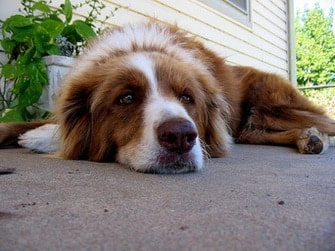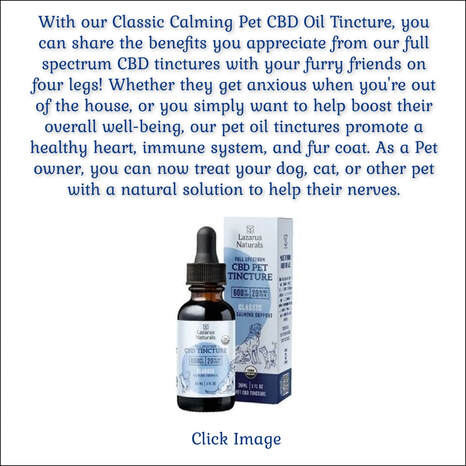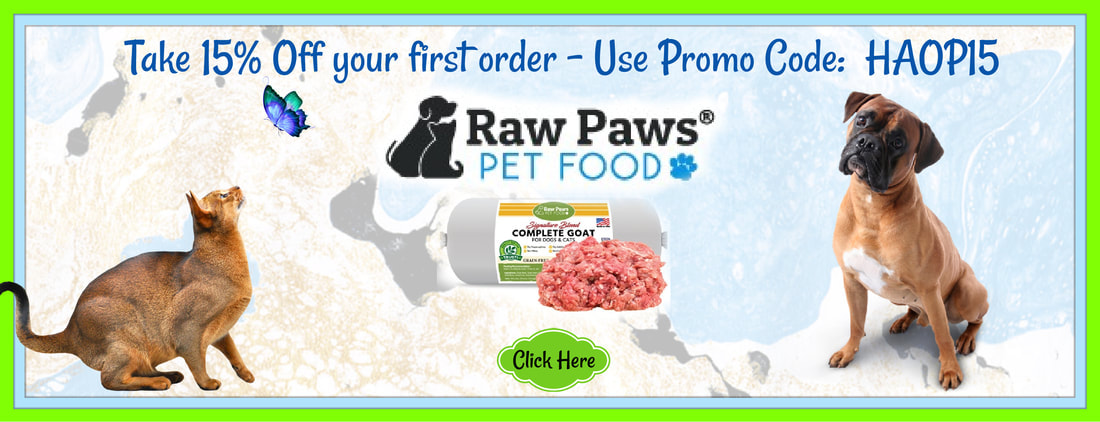
By Colleen Mihelich
We all love our pets madly. They are a constant source of unconditional love, friendship, affection and often of great entertainment. But unfortunately, their life spans are usually much shorter than our own.
As the owner of a pet memorials company, I talk daily with people who have just lost their beloved animal companions, and one of the things I hear most is, "I wish I had prepared for this."
Here are some things you can think about in advance to make it easier when the inevitable occurs:
Do you believe in cremation or burial? The answer determines how you will handle your pet's remains, but it's a very heavy question to deal with when your grief is fresh, so be clear about it ahead of time.
If cremation feels right to you, do you want to preserve the ashes in a pet urn, bury them, spread them somewhere meaningful -- or would you prefer that your veterinarian dispose of your pet's remains? There is no right or wrong answer. Whatever feels right to you is okay.
If you want to bury your pet, can you do so in your yard or a family member's yard, or would you prefer a pet cemetery? If you're going to bury your pet in your yard, what type of vessel will you use? (Be sure to contact your local health or animal control department to make sure home burial is legal where you live.)
If you would prefer a pet cemetery, find some that are close to you and will be convenient to visit. Compare prices and tour the facilities. Although this is not a fun task, it will be easier to choose a cemetery when you're not mourning. Once you find a cemetery you feel comfortable with, find out what types of grave markers they allow and if the plot number needs to be engraved on the stone.
Whether you keep your pet's remains or not, you can create a beautiful and peaceful spot in your yard where your pet often napped or hung out and where you can go to reflect and remember. You can mark this spot with a pet grave marker whether your pet is buried there or not. The marker can simply be a tribute to your friend.
We prepare for the loss of our human loved ones, so why not prepare for the loss of our animal companions? If it's too hard to think about now, at least ask a close family member or friend in advance to help you to make these difficult decisions when the time comes.
The one thing all pet owners have in common when they lose their pet is the need to honor their friend's memory with dignity. There are many options available, so choose the one that feels best for you and that you feel is most appropriate for the memory of your animal companion.
We all love our pets madly. They are a constant source of unconditional love, friendship, affection and often of great entertainment. But unfortunately, their life spans are usually much shorter than our own.
As the owner of a pet memorials company, I talk daily with people who have just lost their beloved animal companions, and one of the things I hear most is, "I wish I had prepared for this."
Here are some things you can think about in advance to make it easier when the inevitable occurs:
Do you believe in cremation or burial? The answer determines how you will handle your pet's remains, but it's a very heavy question to deal with when your grief is fresh, so be clear about it ahead of time.
If cremation feels right to you, do you want to preserve the ashes in a pet urn, bury them, spread them somewhere meaningful -- or would you prefer that your veterinarian dispose of your pet's remains? There is no right or wrong answer. Whatever feels right to you is okay.
If you want to bury your pet, can you do so in your yard or a family member's yard, or would you prefer a pet cemetery? If you're going to bury your pet in your yard, what type of vessel will you use? (Be sure to contact your local health or animal control department to make sure home burial is legal where you live.)
If you would prefer a pet cemetery, find some that are close to you and will be convenient to visit. Compare prices and tour the facilities. Although this is not a fun task, it will be easier to choose a cemetery when you're not mourning. Once you find a cemetery you feel comfortable with, find out what types of grave markers they allow and if the plot number needs to be engraved on the stone.
Whether you keep your pet's remains or not, you can create a beautiful and peaceful spot in your yard where your pet often napped or hung out and where you can go to reflect and remember. You can mark this spot with a pet grave marker whether your pet is buried there or not. The marker can simply be a tribute to your friend.
We prepare for the loss of our human loved ones, so why not prepare for the loss of our animal companions? If it's too hard to think about now, at least ask a close family member or friend in advance to help you to make these difficult decisions when the time comes.
The one thing all pet owners have in common when they lose their pet is the need to honor their friend's memory with dignity. There are many options available, so choose the one that feels best for you and that you feel is most appropriate for the memory of your animal companion.
"Pre-Loss Bereavement" and the Power of Bargaining
by Moira Anderson Allen, M.Ed.
There is a stage of grief that one hears very little, if anything, about. It's the hidden stage, a stage that friends and family may have difficulty understanding. It's a stage when people are most likely to ask why you are grieving -- because your pet hasn't even died yet!
It's the stage I call "pre-loss bereavement." It begins when you realize, with absolutely no wiggle-room for argument, that your pet is going to die. You don't know when, but you know loss is coming. It may not even be coming soon; your pet may have weeks, months, even a year or more of life ahead. But you know that you have reached "the beginning of the end."
It may begin with a diagnosis of a final, incurable disease or condition. When an older cat is diagnosed with borderline kidney failure, for example, you know that you may be able to take steps to manage the problem and keep "full failure" at bay for a time-- but you're never going to be able to accomplish a "cure." Or, it may begin when you look at your pet with "newly opened eyes," and notice changes in its health or condition that have been taking place slowly over time. When a pet gradually loses weight, for example, it's easy to overlook subtle, ongoing changes to its appearance, because you never see a sudden, dramatic alteration. Then, one day, you look at your pet and realize that you can see every rib, every bump of its spine.
Whatever the trigger, pre-loss bereavement begins when you realize not just intellectually, but emotionally, that you are going to lose your pet. It is something you have always "known," from the day you brought your pet home -- but now it is not simply known, but felt, deeply, keenly, painfully. Now, you may find yourself in something of a "pet loss limbo" -- you begin to grieve the loss that is coming, but there is no "closure" to your grief. You can't "get over it" because the loss hasn't actually happened yet. And you know that things are only going to get worse before they get better.
This is the period in which you are likely to experience all the classic Kubler-Ross "stages" of grief: Denial, Anger, Bargaining, Depression, Acceptance. Denial may have preceded this stage, vanishing like a toxic bubble the day you accept and acknowledge the diagnosis or changes in your pet -- or, it may resurface from time to time, as you try to convince yourself that your pet's condition isn't really that bad. Anger can come at odd times -- when, for example, you think you are taking your pet to the vet for the last time, and manage to psyche yourself up to make the most painful decision, only to have an unexpected "reprieve." Yes, of course you are glad to bring your pet home again -- but you may feel a twinge of irrational anger at having had to go through all that for "nothing", only to have to go through it again. Depression comes and goes as you contemplate a future without your pet. But the most common reaction to this stage is likely to be bargaining -- bargaining with your pet, your vet, yourself, or your higher power for anything that will extend (or improve) the life of your pet.
I know this stage well. Several years ago, my 15-year-old cat, Nani, was diagnosed with borderline kidney disease. At the time, she seemed to be deteriorating rapidly; I doubted she had more than a few months to live. And so I entered the "bargaining" stage (or, for some of us, the "begging" stage).
But what could I bargain for? I knew I could not hope for a cure. We weren't sure how old Nani was, as she was a young adult when we adopted her, but we knew she was at least 15 and possibly 16. While cats occasionally live to 20 or longer, such lifespans are rare, and not likely in a cat already suffering from kidney disease. So what could I ask (and pray) for that might have some chance of success?
There is a stage of grief that one hears very little, if anything, about. It's the hidden stage, a stage that friends and family may have difficulty understanding. It's a stage when people are most likely to ask why you are grieving -- because your pet hasn't even died yet!
It's the stage I call "pre-loss bereavement." It begins when you realize, with absolutely no wiggle-room for argument, that your pet is going to die. You don't know when, but you know loss is coming. It may not even be coming soon; your pet may have weeks, months, even a year or more of life ahead. But you know that you have reached "the beginning of the end."
It may begin with a diagnosis of a final, incurable disease or condition. When an older cat is diagnosed with borderline kidney failure, for example, you know that you may be able to take steps to manage the problem and keep "full failure" at bay for a time-- but you're never going to be able to accomplish a "cure." Or, it may begin when you look at your pet with "newly opened eyes," and notice changes in its health or condition that have been taking place slowly over time. When a pet gradually loses weight, for example, it's easy to overlook subtle, ongoing changes to its appearance, because you never see a sudden, dramatic alteration. Then, one day, you look at your pet and realize that you can see every rib, every bump of its spine.
Whatever the trigger, pre-loss bereavement begins when you realize not just intellectually, but emotionally, that you are going to lose your pet. It is something you have always "known," from the day you brought your pet home -- but now it is not simply known, but felt, deeply, keenly, painfully. Now, you may find yourself in something of a "pet loss limbo" -- you begin to grieve the loss that is coming, but there is no "closure" to your grief. You can't "get over it" because the loss hasn't actually happened yet. And you know that things are only going to get worse before they get better.
This is the period in which you are likely to experience all the classic Kubler-Ross "stages" of grief: Denial, Anger, Bargaining, Depression, Acceptance. Denial may have preceded this stage, vanishing like a toxic bubble the day you accept and acknowledge the diagnosis or changes in your pet -- or, it may resurface from time to time, as you try to convince yourself that your pet's condition isn't really that bad. Anger can come at odd times -- when, for example, you think you are taking your pet to the vet for the last time, and manage to psyche yourself up to make the most painful decision, only to have an unexpected "reprieve." Yes, of course you are glad to bring your pet home again -- but you may feel a twinge of irrational anger at having had to go through all that for "nothing", only to have to go through it again. Depression comes and goes as you contemplate a future without your pet. But the most common reaction to this stage is likely to be bargaining -- bargaining with your pet, your vet, yourself, or your higher power for anything that will extend (or improve) the life of your pet.
I know this stage well. Several years ago, my 15-year-old cat, Nani, was diagnosed with borderline kidney disease. At the time, she seemed to be deteriorating rapidly; I doubted she had more than a few months to live. And so I entered the "bargaining" stage (or, for some of us, the "begging" stage).
But what could I bargain for? I knew I could not hope for a cure. We weren't sure how old Nani was, as she was a young adult when we adopted her, but we knew she was at least 15 and possibly 16. While cats occasionally live to 20 or longer, such lifespans are rare, and not likely in a cat already suffering from kidney disease. So what could I ask (and pray) for that might have some chance of success?
I chose to ask for "time." I realized, looking at my wasting-thin kitty, that Nani had been suffering from a certain amount of "attention neglect" over the previous year. We had undergone a stressful move and job change, cramming ourselves, our goods and three cats into a very small duplex. Nani had not been getting the same amount of lap time, cuddle time, and sleep-on-your-face time that she had enjoyed previously. I felt a surge of guilt; if only I could have some time to make that up to her. Give me time, I asked, to make sure that in her final days, she feels loved; give me time to give her the attention and cuddling that means so much to her. My part of the "bargain," of course, was to provide those things!
Miraculously, time was given. In 1999, I doubted Nani would survive six months; she survived for more than four years. Each time she seemed to slip toward the edge, a change of diet would bring about an amazing rally. Even though she lost nearly 1/6 of her original weight, and underwent surgery for a lymphoma, she has hung in there.
More importantly, she had "time" to enjoy renewed attention. She had more years to curl up on whomever was resting (or sleeping) in the recliner (and if you were "resting," a curled-up, purring Nani was almost certain to put you to sleep). She had time to play with the other cats, and even to chase 18-pound Brisco down the hall if he forgot his manners. She had time to watch the birds at the bird-feeder, and the squirrels at the squirrel-feeder. Her one disappointment was that we no longer allowed her on the top shelf of the closet, for fear she might jump down and injure herself.
Eventually we looked at Nani and come to the conclusion that "time" was running out. Her weight loss had accelerated, and a reaction to a prescribed medication made her seriously ill. Though she managed yet another rally, we could see that she was slower, stiffer, weaker, thinner. The time was coming to make that final decision.
We faced this prospect with acceptance, however. We had a peace in our hearts about what must come, because we had a chance to make sure that Nani's last days were as happy and comfortable as we could make them. Despite the grief of the "pet loss limbo" period, we had the comfort of knowing that death didn't take us by surprise; we weren't left regretting the things we hadn't done, or wishing that we'd had a chance to do things differently. We kept the first half of our bargain (making life better for Nani), and now we faced the second half: Letting Nani go.
Miraculously, time was given. In 1999, I doubted Nani would survive six months; she survived for more than four years. Each time she seemed to slip toward the edge, a change of diet would bring about an amazing rally. Even though she lost nearly 1/6 of her original weight, and underwent surgery for a lymphoma, she has hung in there.
More importantly, she had "time" to enjoy renewed attention. She had more years to curl up on whomever was resting (or sleeping) in the recliner (and if you were "resting," a curled-up, purring Nani was almost certain to put you to sleep). She had time to play with the other cats, and even to chase 18-pound Brisco down the hall if he forgot his manners. She had time to watch the birds at the bird-feeder, and the squirrels at the squirrel-feeder. Her one disappointment was that we no longer allowed her on the top shelf of the closet, for fear she might jump down and injure herself.
Eventually we looked at Nani and come to the conclusion that "time" was running out. Her weight loss had accelerated, and a reaction to a prescribed medication made her seriously ill. Though she managed yet another rally, we could see that she was slower, stiffer, weaker, thinner. The time was coming to make that final decision.
We faced this prospect with acceptance, however. We had a peace in our hearts about what must come, because we had a chance to make sure that Nani's last days were as happy and comfortable as we could make them. Despite the grief of the "pet loss limbo" period, we had the comfort of knowing that death didn't take us by surprise; we weren't left regretting the things we hadn't done, or wishing that we'd had a chance to do things differently. We kept the first half of our bargain (making life better for Nani), and now we faced the second half: Letting Nani go.
While some psychologists consider bargaining to be nothing more than a mental game we play to avoid or ignore grief, I believe it can be genuinely helpful -- provided one is realistic about the process. If you find yourself in "pet loss limbo," you may find that "bargaining" is an effective way to ease your passage from grief to acceptance. Here are some tips on "healthy" bargaining:
1) Be realistic about your pet's condition. Don't expect a complete, miraculous cure; you'll only be disappointed. Instead, look for ways to work within and around that condition to extend and improve your pet's life.
2) Focus your efforts on your pet's well-being, not your own. Don't try to make a "bargain" with God or the universe just to keep yourself from feeling pain, or to postpone that pain. Instead, use this time to seek ways to improve your pet's life and comfort level. By doing so, you'll enhance your own ability to accept the inevitable.
3) Use whatever time your pet has left to take care of "unfinished business." If you haven't spent as much time with your pet as you'd like, spend it now. If there are special treats or experiences that your pet particularly enjoys, use this time to provide them. The best way to spend this time is to ensure that, when your pet dies, you aren't left with regrets and self-recriminations.
4) Seek a balance between your pet's health and its general comfort and happiness. Often, for example, a pet may loathe the "special diet" that is prolonging its life. If your pet starts losing weight because it refuses to eat a prescription diet, you may not be doing it any favors by withholding its preferred foods. Similarly, if life-prolonging treatments are more stressful or painful than the disease they're designed to cure, you may need to make a decision about "quality" of life vs. "length" of life.
5) Keep your side of the "bargain." If you've asked for "time" to give your pet extra love and attention, and you miraculously receive that time, use it! It may, indeed, be a miracle.
6) Be prepared to take "no" for an answer. I firmly believe in the power of prayer, but not all prayers are answered as we would wish. If you seek to "bargain" in the last days of your pet's life, you must accept the possibility that you won't get what you're asking for. If and when that occurs, don't waste time and emotional energy blaming yourself or the universe for failing to respond to your wishes.
7) Understand that a "bargain" isn't going to change the final outcome. If your pet has a terminal illness, you may gain the gift of time -- but it is a temporary gift. Use that time, not only to improve your pet's quality of life, but to come to terms with the inevitability of loss. You may find that this precious gift of time is just what you need to work through many of the other emotions of grief, so that you can face the final loss of your pet with a measure of acceptance and peace.
1) Be realistic about your pet's condition. Don't expect a complete, miraculous cure; you'll only be disappointed. Instead, look for ways to work within and around that condition to extend and improve your pet's life.
2) Focus your efforts on your pet's well-being, not your own. Don't try to make a "bargain" with God or the universe just to keep yourself from feeling pain, or to postpone that pain. Instead, use this time to seek ways to improve your pet's life and comfort level. By doing so, you'll enhance your own ability to accept the inevitable.
3) Use whatever time your pet has left to take care of "unfinished business." If you haven't spent as much time with your pet as you'd like, spend it now. If there are special treats or experiences that your pet particularly enjoys, use this time to provide them. The best way to spend this time is to ensure that, when your pet dies, you aren't left with regrets and self-recriminations.
4) Seek a balance between your pet's health and its general comfort and happiness. Often, for example, a pet may loathe the "special diet" that is prolonging its life. If your pet starts losing weight because it refuses to eat a prescription diet, you may not be doing it any favors by withholding its preferred foods. Similarly, if life-prolonging treatments are more stressful or painful than the disease they're designed to cure, you may need to make a decision about "quality" of life vs. "length" of life.
5) Keep your side of the "bargain." If you've asked for "time" to give your pet extra love and attention, and you miraculously receive that time, use it! It may, indeed, be a miracle.
6) Be prepared to take "no" for an answer. I firmly believe in the power of prayer, but not all prayers are answered as we would wish. If you seek to "bargain" in the last days of your pet's life, you must accept the possibility that you won't get what you're asking for. If and when that occurs, don't waste time and emotional energy blaming yourself or the universe for failing to respond to your wishes.
7) Understand that a "bargain" isn't going to change the final outcome. If your pet has a terminal illness, you may gain the gift of time -- but it is a temporary gift. Use that time, not only to improve your pet's quality of life, but to come to terms with the inevitability of loss. You may find that this precious gift of time is just what you need to work through many of the other emotions of grief, so that you can face the final loss of your pet with a measure of acceptance and peace.
Euthanasia: The Most Painful Decision
by Moira Anderson Allen, M.Ed.
Many think of bereavement as beginning after loss. For many, however, grief can begin much earlier. Often, it begins the day you realize that your pet is approaching the end of its life -- even though the final loss of that pet may still be many months distant.
This stage of grief is especially difficult, because it is without closure. You can't make an effort to "get over it" or "feel better," because the loss itself has not occurred. Thus, no matter how bad you feel, you know that things are just going to get worse. It can be difficult to find comfort during this stage, for even people who understand the pain of bereavement may wonder why you are grieving before your cat has actually died.
Grief for impending loss is complicated by the need to make difficult, painful decisions. How much treatment should you pursue? At what point will treatment cause more trauma than relief? Can you provide the care needed to keep your pet comfortable -- and will your cat reach a point where no amount of care can do this? At what point, if any, should you consider euthanasia?
Sometimes circumstances don't give you time to ask such questions. An unexpected illness might give you days (or at most, weeks) to consider these issues; an accident or injury might leave you with hours, or even minutes. Whenever possible, however, it's best to develop a plan, taking into consideration three basic issues:
1) When should you consider euthanasia? When your pet is ill, this may be the last question you want to think about. Yet it is the most important question you may need to answer.
Start by asking your veterinarian what types of symptoms to expect as your pet's illness progresses. What stages will the disease take? How long before kidney disease produces incontinence or renal failure? How long before tumor cells invade the lungs or other organs? How long before symptoms become medically unmanageable, before pain becomes severe and un-treatable? At what point will your pet become unable to function normally; at what point will its suffering become extreme?
This information can help you form your plan. For example, you may decide to seriously consider euthanasia when your pet can no longer breathe easily, or eat or drink, or find a comfortable position in which to sleep, or when it seems to find your touch painful. By defining a "decision point" in advance, you place boundaries on the suffering your pet is likely to endure.
2) Will you be there? Many people feel it is important to be present during euthanasia. Many others feel unable to handle this traumatic event. And make no mistake: Witnessing the euthanasia of your beloved companion IS traumatic (though it can also help allay fears that your companion suffered). This is not a decision to be made lightly, or based on someone else's choices.
Most feel that the pet's well-being is the most important consideration. If you believe your pet will feel more comfortable or secure in your presence, you'll probably want to stay, no matter how difficult it will be. On the other hand, if you're concerned that your own reaction and grief may disturb the pet more than the process itself, you may prefer to stay away.
If you choose not to be present, don't simply leave your pet with the veterinarian. Some clinics hold "to-be-euthanized" pets until after clinic hours, which simply adds to an animal's trauma. Make sure that your pet is going to be euthanized immediately, while you wait in the waiting room or car.
3) What will you do next? The worst time to decide what to do with your pet's remains is at the last minute. It's far better to begin discussing options weeks in advance. Indeed, even the owner of a perfectly healthy pet can begin considering the answer to this question at any time, particularly if you want to make special funeral or private cremation arrangements, or want a particular type of funerary product (such as a special urn or casket).
For many, this decision involves both physical and spiritual issues. How do you (and your family) distinguish between body and soul? Do you feel that your pet will be "closer" to you spiritually if its remains are close to you physically (e.g., in a cremation urn)? Do you feel that your pet's spirit will be happier if it is interred in a familiar, beloved location? Or do you feel that your pet's soul and personality are not associated with its physical remains, which you're quite happy to leave with the veterinarian? There's nothing foolish about such considerations. For many, the certainty that they have provided for their cat's spiritual needs can go a long way toward healing the spiritual wounds of the owner.
Many think of bereavement as beginning after loss. For many, however, grief can begin much earlier. Often, it begins the day you realize that your pet is approaching the end of its life -- even though the final loss of that pet may still be many months distant.
This stage of grief is especially difficult, because it is without closure. You can't make an effort to "get over it" or "feel better," because the loss itself has not occurred. Thus, no matter how bad you feel, you know that things are just going to get worse. It can be difficult to find comfort during this stage, for even people who understand the pain of bereavement may wonder why you are grieving before your cat has actually died.
Grief for impending loss is complicated by the need to make difficult, painful decisions. How much treatment should you pursue? At what point will treatment cause more trauma than relief? Can you provide the care needed to keep your pet comfortable -- and will your cat reach a point where no amount of care can do this? At what point, if any, should you consider euthanasia?
Sometimes circumstances don't give you time to ask such questions. An unexpected illness might give you days (or at most, weeks) to consider these issues; an accident or injury might leave you with hours, or even minutes. Whenever possible, however, it's best to develop a plan, taking into consideration three basic issues:
1) When should you consider euthanasia? When your pet is ill, this may be the last question you want to think about. Yet it is the most important question you may need to answer.
Start by asking your veterinarian what types of symptoms to expect as your pet's illness progresses. What stages will the disease take? How long before kidney disease produces incontinence or renal failure? How long before tumor cells invade the lungs or other organs? How long before symptoms become medically unmanageable, before pain becomes severe and un-treatable? At what point will your pet become unable to function normally; at what point will its suffering become extreme?
This information can help you form your plan. For example, you may decide to seriously consider euthanasia when your pet can no longer breathe easily, or eat or drink, or find a comfortable position in which to sleep, or when it seems to find your touch painful. By defining a "decision point" in advance, you place boundaries on the suffering your pet is likely to endure.
2) Will you be there? Many people feel it is important to be present during euthanasia. Many others feel unable to handle this traumatic event. And make no mistake: Witnessing the euthanasia of your beloved companion IS traumatic (though it can also help allay fears that your companion suffered). This is not a decision to be made lightly, or based on someone else's choices.
Most feel that the pet's well-being is the most important consideration. If you believe your pet will feel more comfortable or secure in your presence, you'll probably want to stay, no matter how difficult it will be. On the other hand, if you're concerned that your own reaction and grief may disturb the pet more than the process itself, you may prefer to stay away.
If you choose not to be present, don't simply leave your pet with the veterinarian. Some clinics hold "to-be-euthanized" pets until after clinic hours, which simply adds to an animal's trauma. Make sure that your pet is going to be euthanized immediately, while you wait in the waiting room or car.
3) What will you do next? The worst time to decide what to do with your pet's remains is at the last minute. It's far better to begin discussing options weeks in advance. Indeed, even the owner of a perfectly healthy pet can begin considering the answer to this question at any time, particularly if you want to make special funeral or private cremation arrangements, or want a particular type of funerary product (such as a special urn or casket).
For many, this decision involves both physical and spiritual issues. How do you (and your family) distinguish between body and soul? Do you feel that your pet will be "closer" to you spiritually if its remains are close to you physically (e.g., in a cremation urn)? Do you feel that your pet's spirit will be happier if it is interred in a familiar, beloved location? Or do you feel that your pet's soul and personality are not associated with its physical remains, which you're quite happy to leave with the veterinarian? There's nothing foolish about such considerations. For many, the certainty that they have provided for their cat's spiritual needs can go a long way toward healing the spiritual wounds of the owner.
Myths About Euthanasia
Many people have mixed feelings about euthanasia, for good reason. No matter how well-intentioned we may be, this act feels like murder to many of us, and guilt may often haunt us long after the act.
Even when we know intellectually that euthanasia may be the "best" or "most merciful" choice, that means little when we face the decision itself. Many pet owners cling to misperceptions that provide apparent justification for postponing this decision -- often at the expense of the pet itself. Three common misperceptions include:
1) Euthanasia isn't nature's way. Some pet owners reject euthanasia as "unnatural." Nature, some say, has a timetable for every life, and by artificially ending a life, we're disrupting nature's plan. While charming, this belief overlooks the fact that by providing treatment, surgery, medication, or any other form of care for a sick (or injured) pet, we are already extending that pet's life far beyond what would occur if matters were left in the not-so-tender hands of "nature." Euthanasia is often not so much a question of "artificially ending" a life, but of determining when to cease artificially extending that life.
2) Euthanasia is selfish. One of the commonest sources of guilt is the belief that one has euthanized a pet "too soon" or for "selfish" reasons. "I should have tried harder," many tell themselves. "I should have been willing to do more, spend more, get a second opinion, stay up all night to take care of her." Yet the person who worries most about not having "done enough" is often a person who has already gone to superhuman efforts to care for that pet. A far more dangerous form of selfishness is to prolong a pet's suffering simply to postpone one's own.
3) My pet will tell me when it's "time." Many of us have heard of pets who allegedly offered some indication of acceptance of death, of being "ready to move on." And who among us would not welcome that sense of being granted "permission" to end a pet's life? Such a "signal" would remove the dreadful burden of having to make that decision on our own. Unfortunately, for many that signal never comes. By convincing ourselves that our pets will "tell us" when it is time to die, we risk two hazards: Prolonging a pet's suffering by waiting for a sign that never comes, or torturing ourselves with guilt for acting "too soon."
The painful truth is that if your pet is terminally ill, and especially if it is suffering and unable to function, it will die; the decision you must make is not whether its life will end, but how, and how much discomfort you are willing to allow it to endure.
Stefanie Schwartz, DVM, sums up the issue in one vital question in her book, Canine and Feline Behavior Problems: "Which choice will bring you the least cause for regret after the pet is gone?" Unfortunately, "no regret" is often not an option.
Many people have mixed feelings about euthanasia, for good reason. No matter how well-intentioned we may be, this act feels like murder to many of us, and guilt may often haunt us long after the act.
Even when we know intellectually that euthanasia may be the "best" or "most merciful" choice, that means little when we face the decision itself. Many pet owners cling to misperceptions that provide apparent justification for postponing this decision -- often at the expense of the pet itself. Three common misperceptions include:
1) Euthanasia isn't nature's way. Some pet owners reject euthanasia as "unnatural." Nature, some say, has a timetable for every life, and by artificially ending a life, we're disrupting nature's plan. While charming, this belief overlooks the fact that by providing treatment, surgery, medication, or any other form of care for a sick (or injured) pet, we are already extending that pet's life far beyond what would occur if matters were left in the not-so-tender hands of "nature." Euthanasia is often not so much a question of "artificially ending" a life, but of determining when to cease artificially extending that life.
2) Euthanasia is selfish. One of the commonest sources of guilt is the belief that one has euthanized a pet "too soon" or for "selfish" reasons. "I should have tried harder," many tell themselves. "I should have been willing to do more, spend more, get a second opinion, stay up all night to take care of her." Yet the person who worries most about not having "done enough" is often a person who has already gone to superhuman efforts to care for that pet. A far more dangerous form of selfishness is to prolong a pet's suffering simply to postpone one's own.
3) My pet will tell me when it's "time." Many of us have heard of pets who allegedly offered some indication of acceptance of death, of being "ready to move on." And who among us would not welcome that sense of being granted "permission" to end a pet's life? Such a "signal" would remove the dreadful burden of having to make that decision on our own. Unfortunately, for many that signal never comes. By convincing ourselves that our pets will "tell us" when it is time to die, we risk two hazards: Prolonging a pet's suffering by waiting for a sign that never comes, or torturing ourselves with guilt for acting "too soon."
The painful truth is that if your pet is terminally ill, and especially if it is suffering and unable to function, it will die; the decision you must make is not whether its life will end, but how, and how much discomfort you are willing to allow it to endure.
Stefanie Schwartz, DVM, sums up the issue in one vital question in her book, Canine and Feline Behavior Problems: "Which choice will bring you the least cause for regret after the pet is gone?" Unfortunately, "no regret" is often not an option.


















